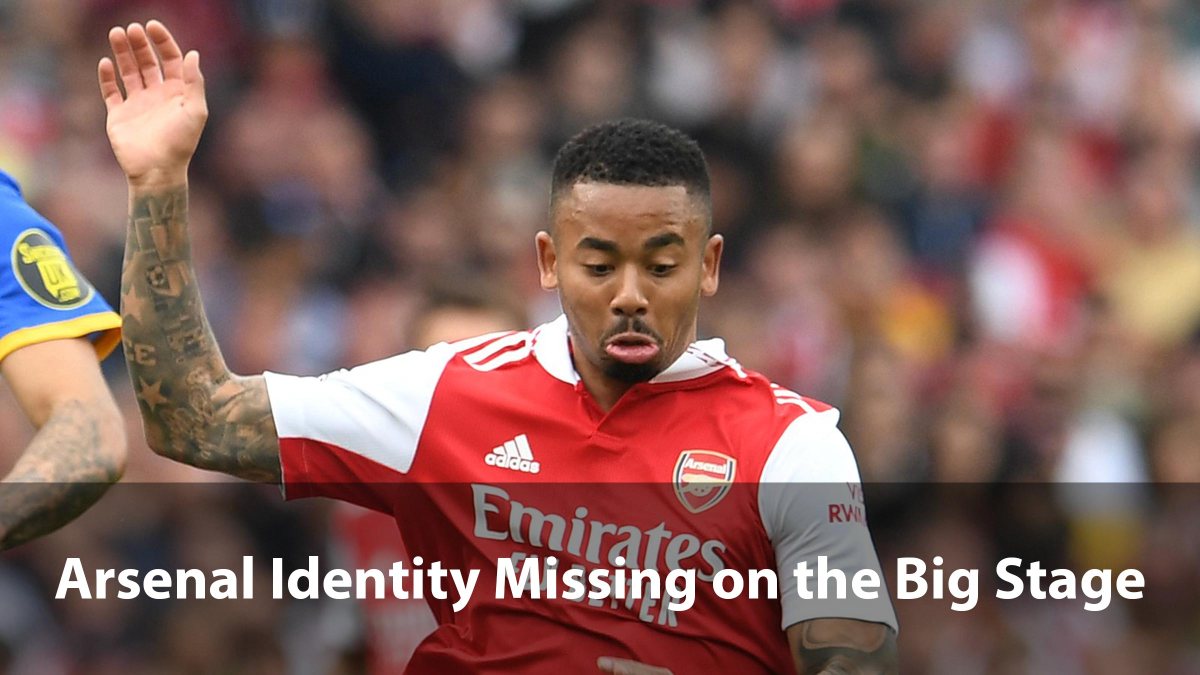Blog’s Hero Image Choice: My face during the 90 minutes versus Brighton summarized in Jesus form.
All season, Arsenal and Arteta have talked about this idea of ‘identity’. Establishing, maintaining, retaining, and flourishing under this brand of Arsenal play that’s made up of ‘non-negotiables’, tactical setups, fluid play, and expressive and expansive football. Culminating in that single word, identity, we have even seen a visualization of it hung in the team’s locker room.

A reminder to this side of who they are, who they want to be, and how they want to play, this concept has been in the works for at least two seasons but felt as though it really blossomed with the season’s squad.
The levels of specificity were raised, extra quality was injected, and the rise in this side’s ceiling of play was evident from preseason when Arsenal won every televised/streamed match including a 4-0 drubbing of Chelsea and 6-0 smashing of Sevilla to end it. What followed was 21 matches that saw Arsenal soar.
The first half of this season was almost the stuff of dreams, too good to be true. Twenty-one matches in all competitions and Arsenal won 17 of them, drawing 2 and losing 2. After the World Cup break, Arsenal hit the ground running, stringing together six more results (although a frustrating draw to Newcastle).
After 19 matches, Arsenal had 16 wins, 2 draws, 1 loss; scoring 45 goals and only conceding 16. 50 points. Remarkable.
It was in the second half of the season that Arsenal’s identity was truly tested. It was shaken in January and February by their first run of poor results from City foiling us twice over and Sean Dyche’s new Everton side and Brentford showing points of exploitation. Arsenal’s identity could be shaken with a few different combinations — although only City can do what City do. We met athletic, compact low/mid blocks and we saw teams start to try and invite our press in to bypass it and win the duel higher up the pitch, something City and Brentford showed an ability to do with Toney and Haaland.
It was a warning shot across the bow and maybe a bit of foreshadowing, but Arsenal took this in stride and continued their charge forward. Until April rolled around, when this identity faced a stack up of challenges they stopped overcoming (or preventing). Some things become too much.
The backline have been devastated by injuries, along with parts of the spine. Key parts of Arsenal’s identity were swept away by heated contests, elevated by conceding goals at all the wrong times — sometimes through our own undoing — or snatched away by a need to adjust to injuries. Arteta has got some things wrong at times and players haven’t rewarded the manager for his faith at other times. April proved outright that a team has to win as a team or they lose as a team.
Be that injuries, referees, hostile atmospheres, poorly timed concessions, combinations of it all that leads to a leaking defense, these are aspects of a season that are always going to challenge a team. To get better, Arsenal need to look at how they overcome them when things stack up.
Teams have figured out and understood this Arsenal identity the more they have seen it. They have found ways to combat it. Which means it will be on Arteta, Edu, the club, and the players to demonstrate their ability to stay ahead of the curve. If there is one thing impressive about Pep tactically, it’s that he never runs out of ideas to tweak, change and alter how his team plays to keep opposition chasing and his players engaged (on top of the best quality to execute, of course). Arteta has created a fantastic foundation, now it’s time to build on that and add more layers to this Arsenal way.
Too many moments, stretches, or full matches in the run-in have we seen the identity that put this team leaps and bounds above 18/19ths of the league go missing. I think Arteta and the team know it. At least, that’s how I read this quote from Arteta after yesterday’s Brighton match:
“You cannot do what we did in the second half. If the team is capable of doing that when it comes to the biggest stage there are a lot of things we have to think about and analyse.”
Mikel Arteta on Brighton.
The identity has to shine through in the face of adversity as resolutely as it does when everything is clicking seamlessly. The roots of our identity must be so ingrained that in face of lineup rotation, injuries, an unfavorable match script, the play drives forward. Maybe it’s impossible not to see the levels drop. Only one team on the face of the Earth currently has the depth to have little to no drop in play, regardless of who enters and exits the lineup. But that message above is one that will now be branded into these young stars over the summer, ingrained day after day as they mature.
A 0-3 loss to (almost) anyone at home is an embarrassing one, you can’t shy away from that. That’s not a result that is “acceptable”, but it’s one that happens when the identity is gone and the season reaches a point of complete desperation. In the end, you have to admit Arsenal were outplayed across 90 minutes, in a lot of departments.
There’s a real degree of fortune/misfortune to Brighton’s first two goals yesterday. But I would say in the same breath that teams create their fortune/misfortune, and both teams had done that one the day.
Adversity started with Zinchenko being done for the season. I find Kieran Tierney to be a quality player with an incredible amount of left back ability — I wrote about our left back spectrum in November — but he’s never been asked to invert in his career and there are skills needed for success there that he has not sharpened over years. The ask is for him to not only gain those skills over night, but do it at a Premier League level, and that’s a ginormous ask. He’s played his game, but Arsenal were missing Zinchenko’s talent on the ball to help them in the buildup phase and in retaining possession.
That was a blow to Arsenal’s desired flow, but the match script goes out the window when the match starts with a heavy challenge from Martinelli on Mitoma — he should have been booked for it — and then a retaliatory, dangerous tackle from Caicedo on Martinelli. The ref shockingly books neither player which sets a horrible precedent for booking players and the game becomes fiery, heated, and dangerous. His response is to begin calling every nibble and bite to try and strong-arm the match into control. With that, two of this league’s most fluid, fun, attacking sides are stuck in a start-stop-stop-start match script.
23 fouls were called in 63 minutes, 30 fouls called in 90. One foul every 3 minutes. Even with 17 of the calls going in Arsenal’s favor, it was sporadic and messy. A really bad display of control and officiating again for both sides to deal with. But both sides had to deal with it (even if Caicedo should have been booked so early allowing him to commit a handful more and still never being carded.
Arsenal didn’t deal with it. They couldn’t get out of their half in rhythm and were forced to push the ball from back to front with long balls that bypassed Brighton press. At times it worked, but most the chances Arsenal created were half-chances at best. Trossard and Saka had two of the best chances, otherwise Arsenal’s 14 shots only yielded two on frame and .92 xG.
Across the 90 minutes, Arsenal allowed Brighton to have too much of the ball, a confusing fact considering Arsenal’s press was effective on multiple occasions (although we couldn’t convert it into serious chances). It felt like a stark reminder that “not all duel wins are created equally”. On the day, Arsenal won only one less duel than Brighton, but it felt like Brighton won the ones that mattered most. They cleaned up the loose balls, they won the duels that kept Arsenal pinned, and they converted them into goals — fortunate goals or not.
In the end, I was left counting on my fingers the aspects on display versus Brighton that hadn’t seemed like us at the 19 match mark:
- Less possession
- Struggling in build up phases
- Settling for the long ball
- Silly mistakes
- Fatigued looking players
Losing to Brighton in this fashion makes for a devastating way to eliminate all the remaining hope of a City-slip miracle. If you tie to Brighton, sure it hurts, but a 0-3 loss crushes. It leaves us feeling like Arsenal couldn’t quite take this fight the distance.
This is the growth this team will have to do as they mature, add more quality and talent through purchases, and consider who they have to part ways with. Who fits the identity and how do we retain it in the face of adversity striking not just one department but multiple?
It stings but I will find peace with the fact that Arsenal were and are, comprehensively, the second best team in the league this season. With a sizable gap between themselves and third, they have put themselves in a great place to launch forward from once more. People don’t want to listen to that conversation right now, and I’m not sure I want to hash it out at the moment. But in time, you too will remind yourself that Arsenal were simply not the second best team, and that’s okay.
Time to finish strong with Nottingham Forest and Wolverhampton. Forest still trying to fight their way to safety presents a real opponent. Finish with a bit of honor, now.
Did you enjoy this article?


One reply on “Arsenal Identity Missing on the Big Stage”
[…] Fuente del artículo […]
LikeLike